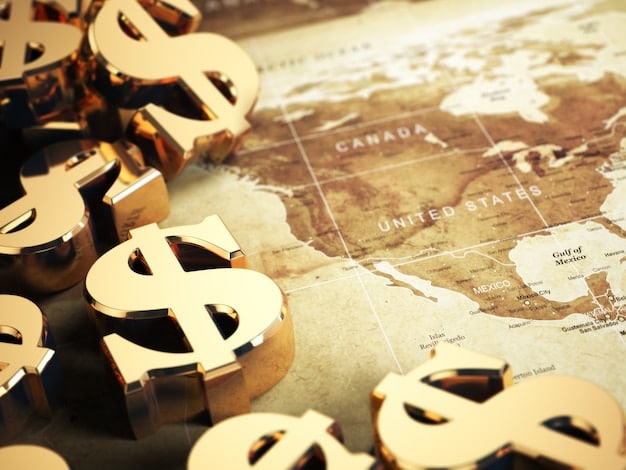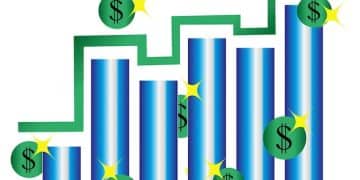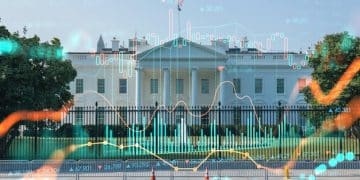US 15% Corporate Tax Hike: Is the Nation Ready?

The prospect of a 15% corporate tax hike in early 2025 in the US presents a complex economic and political challenge, requiring careful consideration of its potential impacts on businesses, consumers, and global competitiveness amidst a divisive national landscape.
As the calendar turns toward 2025, a significant policy discussion looms over the United States: Is the US Ready for the 15% Corporate Tax Hike Debate in Early 2025? This question isn’t merely theoretical; it delves into the heart of America’s economic future, corporate responsibility, and global standing, igniting passionate arguments from various sectors.
The Origin of the 15% Corporate Tax Proposal
The push for a 15% corporate minimum tax has its roots in a global effort to curb tax avoidance by multinational corporations. Historically, the US corporate tax rate has fluctuated, reflecting differing economic philosophies and fiscal priorities. This particular proposal emerged as part of broader American legislative agendas aimed at increasing federal revenue and ensuring that even highly profitable companies contribute a fair share to the public coffers.
The genesis of this specific 15% rate is multifaceted, tied closely to international agreements and domestic political objectives. Countries worldwide have grappled with the challenge of corporate tax avoidance, where large corporations leverage loopholes and international tax structures to pay minimal taxes, often shifting profits to low-tax jurisdictions. This practice has long been a source of frustration for many national governments, impacting their ability to fund essential public services and creating an uneven playing field for smaller, domestically focused businesses.
A Global Mandate: OECD and G20 Initiatives
In response to these global concerns, the Organisation for Economic Co-operation and Development (OECD) and the G20 nations embarked on an ambitious project known as the Base Erosion and Profit Shifting (BEPS) initiative. A key component of this initiative has been the development of a global minimum corporate tax rate. The proposal for a 15% minimum tax gained significant international traction, with numerous countries agreeing in principle to adopt this floor.
- Historical Context: Decades of declining corporate tax burdens on large multinational enterprises.
- International Pressure: A global consensus that a minimum tax is necessary to prevent a “race to the bottom” in corporate taxation among nations.
- Domestic Implications: The US, as a major economic power, plays a crucial role in the success of this global framework.
For the US, aligning with this global minimum tax is seen by proponents as a way to reclaim tax revenue, discourage corporate inversions (where companies reincorporate in lower-tax countries), and foster greater tax equity. The proposal is framed not just as a revenue-generating measure but as a moral imperative to ensure large, profitable corporations pay their share, especially in an era of increasing wealth disparity.
However, the journey from international agreement to domestic implementation is fraught with complexities. While the global minimum tax aims to harmonize corporate tax policies, each nation must tailor its internal legislation to fit these new standards. The upcoming debate in early 2025 in the US will center on how best to integrate this 15% minimum and the broader implications of such a significant shift in corporate tax policy.
Economic Impacts: Forecasts and Fissures
A 15% corporate tax hike is not just a statistical adjustment; it’s a profound economic lever with potential to reshape industries, influence investment decisions, and ultimately, affect consumers. Projections from various think tanks and government agencies offer a spectrum of outcomes, highlighting the complexity of forecasting such a move. Some analyses predict a significant boost to federal revenue, providing resources for infrastructure, social programs, or deficit reduction. Others warn of slowed economic growth, reduced competitiveness, and potential job losses as companies adjust to higher tax burdens.
Revenue Generation vs. Economic Headwinds
Economists on both sides of the aisle acknowledge the direct impact on government coffers. A higher corporate tax rate, even a minimum, theoretically generates more revenue. However, the precise amount depends on numerous factors, including how easily corporations can restructure or shift operations. Moreover, the long-term effects on economic behavior are subject to intense debate.
- Increased Federal Revenue: Proponents argue billions could be added to the treasury, funding critical public services.
- Reduced Corporate Profitability: Higher taxes could compress profit margins, potentially leading to adjustments in corporate strategies.
- Investment Decisions: Companies might reconsider investments in the US, favoring countries with more attractive tax regimes.
The debate also highlights the concept of tax incidence—who ultimately bears the burden of a corporate tax. While levied on corporations, the costs can be passed on to consumers through higher prices, to employees through lower wages or fewer jobs, or to shareholders through reduced dividends. Determining the exact distribution of this burden is crucial for understanding the true economic impact.

Furthermore, the domestic economic landscape in 2025 will play a critical role. If the US economy is already facing inflationary pressures or a slowdown, a tax increase could exacerbate these issues. Conversely, during periods of robust growth, the economy might be better positioned to absorb the changes.
Ultimately, the economic outcome will be a complex interplay of corporate responses, consumer behavior, and the broader global economic environment. The forecasts, while valuable, are based on models that often struggle to capture the full dynamism of a globalized economy, making the actual impacts difficult to predict with absolute certainty.
Political Battlegrounds: Bipartisan Divide and Public Opinion
The journey of any significant tax legislation in the US is invariably a trek through a minefield of political maneuvering, and the 15% corporate tax hike is no exception. The proposal deeply entrenches itself in the fundamental ideological divide that characterizes American politics today, setting the stage for a contentious debate in early 2025.
The Democratic Stance: Fairness and Funding
For Democrats, the minimum corporate tax is a cornerstone of their economic agenda, rooted in principles of fairness and shared prosperity. They argue that the current system allows highly profitable corporations to evade their civic duty, contributing disproportionately little to the nation’s success. Proponents often point to specific examples of large companies paying no federal income tax, even while reporting billions in profits, fueling public outcry and calls for reform.
Key arguments from the Democratic side include:
- Tax Equity: Ensuring large corporations pay their “fair share,” reducing the tax burden on middle-class families.
- Revenue Generation: Funding critical public investments such as infrastructure, clean energy, education, and healthcare.
- Leveling the Playing Field: Preventing tax avoidance that puts smaller, domestic businesses at a disadvantage.
Public opinion often sways in favor of making large corporations pay more, especially when contrasting their tax burdens with those of average citizens. This sentiment provides a strong political impetus for Democrats to pursue such policies, often framing it as a matter of justice and economic responsibility.
The Republican Opposition: Competitiveness and Growth Threats
Republicans, conversely, largely advocate for lower corporate tax rates, emphasizing their belief that such policies stimulate economic growth, encourage investment, and create jobs. They view tax increases as detrimental to competitiveness, potentially driving businesses and capital out of the US.
Their primary concerns include:
- Economic Competitiveness: Fear that higher taxes will make the US less attractive for businesses compared to other nations with lower rates.
- Job Creation: Argument that reduced corporate profits translate to less investment in expansion, research, and development, ultimately curbing job growth.
- Global Disadvantage: While acknowledging global minimum tax efforts, concerns about the specifics of implementation and the potential for the US to overtax its corporations regardless of international agreements.
The Republican stance is often bolstered by business lobbies and conservative economic think tanks, which underscore the importance of competitive tax rates for fostering a vibrant private sector. They argue that the tax burden ultimately falls on consumers and workers, making it a regressive measure.
The upcoming debate will undoubtedly be a clash of these economic philosophies, amplified by the political climate approaching an election cycle. Both parties will leverage data, anecdotes, and public sentiment to champion their respective positions, making the 15% corporate tax hike a central discussion point on the national stage.
Corporate America’s Stance: Navigating Uncertainty
Corporate America’s reaction to the proposed 15% corporate tax hike is far from monolithic, yet a prevailing sentiment of caution, if not outright opposition, can be observed across various sectors. For many large multinational corporations, the prospect of increased tax liabilities directly impacts their bottom line, investment strategies, and global competitiveness. Their lobbying efforts and public statements reflect a complex interplay of these concerns.
Apprehension and Adaptation Strategies
Companies are not merely passive recipients of tax policy; they are active in shaping it and adaptable in responding to it. The initial reaction from many corporate executives often involves expressing apprehension about the potential siphoning off of capital that could otherwise be allocated to research and development, employee compensation, or expansion initiatives. They warn that increased tax burdens could stifle innovation and reduce the capacity for job creation.
However, beyond direct opposition, many large firms are also considering various adaptation strategies:
- Investment Reassessment: Companies may re-evaluate their capital expenditure plans within the US, potentially diverting investments to countries with more favorable tax environments.
- Supply Chain Adjustments: The tax hike could influence decisions regarding where to locate manufacturing, distribution, and administrative functions, potentially leading to some relocation of operations.
- Pricing Strategies: To offset increased tax costs, some businesses might consider adjusting pricing for their goods and services, potentially passing a portion of the tax burden directly to consumers.
- Lobbying and Advocacy: Corporate interest groups and major corporations will undoubtedly intensify their lobbying efforts to influence the final legislative language, seeking carve-outs, exemptions, or a lower rate.
It’s also worth noting that the impact might vary by industry. Capital-intensive industries or those with significant international operations might feel the pinch more acutely than purely domestic service-based businesses. Companies reliant on specific tax credits or deductions may also find their effective tax rates shifting more dramatically.
While some public statements from corporate leaders may express acceptance of the idea of paying a “fair share,” the underlying strategic responses will likely be geared towards minimizing negative impacts on profitability and shareholder value. The debate in early 2025 will give corporations a critical window to articulate their concerns and influence outcomes, making their collective response a significant factor in whether the US is truly ready for such a substantial shift.
Global Competitiveness and the International Framework
The debate surrounding a 15% corporate tax hike in early 2025 for the US is inseparable from the broader context of global economic competitiveness and the ongoing efforts to establish a robust international tax framework. While the proposed hike aligns with the OECD’s global minimum tax initiative, its specific implementation and its interaction with other countries’ tax policies remain critical points of contention.
A Balancing Act: Domestic Needs vs. Global Standing
The Biden administration has largely championed the 15% minimum tax as a way to both secure revenue domestically and to lead by example on the global stage, urging other nations to follow suit and prevent a “race to the bottom” where countries continually lower corporate taxes to attract business. This alignment is intended to foster greater stability and fairness in international taxation.
Key considerations regarding global competitiveness include:
- Harmonization: The US adopting the 15% minimum could encourage more countries to ratify and implement the global tax agreement, creating a more level playing field worldwide.
- Attractiveness for Investment: Critics argue that even with a global minimum, individual US companies might still face higher effective tax rates than competitors in other nations, depending on specific national carve-outs and exceptions.
- Complexity for Multinationals: The implementation of a new tax framework, especially one globally coordinated, introduces significant complexity for multinational corporations operating across different jurisdictions, demanding new accounting and compliance mechanisms.

The concern from some business groups and conservative economists is that if the US moves too aggressively or unilaterally, it could place American companies at a disadvantage, making it less appealing for foreign direct investment or even encouraging American firms to shift operations abroad. They argue that while a global minimum is desirable, the specific design of the US tax code needs to be carefully calibrated to ensure it doesn’t inadvertently harm domestic businesses.
Conversely, proponents argue that a unified global approach makes it harder for companies to simply move their headquarters or intellectual property to avoid taxes, thereby reducing the incentive for tax arbitrage. The goal is to ensure that wherever a multinational company generates its profits, a minimum level of tax is paid somewhere, ideally in the countries where the economic activity actually occurs.
The debate in early 2025 will therefore critically examine whether the US proposal strikes the right balance between its domestic fiscal needs and its desire to remain a competitive and attractive environment for global business, all while fulfilling its commitment to a coordinated international tax system.
Anticipated Impact on Innovation and Startups
The discussion around a 15% corporate tax hike often centers on large, established corporations, but its potential ripple effects on innovation and the startup ecosystem are also a significant concern. While many startups operate at a loss in their early years, thus paying no income tax, the future tax environment can influence venture capital funding, the availability of talent, and overall risk-taking within the economy.
Venture Capital and Investment Climate
For venture capitalists and angel investors, the ultimate profitability of their portfolio companies is paramount. A future landscape with higher corporate taxes could potentially reduce the anticipated returns on investment, making certain ventures less attractive. This isn’t a direct tax on startups, but rather an adjustment in the perceived long-term value of an enterprise.
- Reduced Investor Appetite: If future profitability is dampened by higher taxes, venture capitalists might become more cautious or demand higher returns for their risk, potentially slowing funding rounds.
- Innovation Incentives: Corporate taxes can influence how large companies fund their research and development departments or acquire innovative startups. Higher taxes might lead to reduced internal R&D budgets or less aggressive M&A activity.
Moreover, the availability of tax credits for R&D, often critical for tech and biotech startups, could become even more important. Any changes to these specific incentives could have a more direct impact than the headline corporate tax rate itself. The debate will likely feature discussions on whether the hike might inadvertently discourage the very innovation necessary for long-term economic dynamism.
Talent and Entrepreneurship
A thriving startup ecosystem relies heavily on entrepreneurial spirit and access to top talent. If the overall business environment is perceived as less favorable due to higher taxes, it could subtly influence individuals’ decisions to start new companies or to join burgeoning startups instead of more established firms. While this is a harder impact to quantify, it’s a concern for advocates of a vibrant high-growth sector.
The potential for a 15% corporate minimum tax aims to level the playing field, but its proponents and opponents will dissect its intricate effects on every layer of the economy, including the delicate balance that supports groundbreaking innovation and the birth of future industry leaders. The debate in early 2025 will therefore have to consider not just today’s giants, but tomorrow’s disruptors.
The Road Ahead: Challenges and Compromises
The debate surrounding a 15% corporate tax hike in early 2025 promises to be one of the most challenging and consequential policy discussions facing the US government. The path forward is fraught with political hurdles, economic uncertainties, and the need for delicate legislative compromise. Success will depend on the ability of lawmakers to bridge ideological divides and align on a vision for American competitiveness and fiscal responsibility.
Legislative Hurdles and Negotiations
Any significant tax reform faces an uphill battle in the US Congress. With narrow majorities often dictating legislative outcomes, bipartisan support or at least broad consensus within a party is usually necessary. The current political climate, characterized by deep partisan splits, makes achieving such consensus particularly difficult. Lawmakers will have to confront differing priorities:
- Revenue vs. Stimulus: Balancing the desire for increased federal revenue with concerns about stimulating economic growth.
- Fairness vs. Competitiveness: Reconciling the call for tax fairness with the need to maintain America’s competitive edge on the global stage.
- Simplification vs. Targeted Incentives: Debating whether the tax code should be simplified or continue to offer targeted incentives for specific behaviors (e.g., R&D, green energy).
Compromise will be essential. This could involve modifications to the proposed 15% rate, the introduction of new deductions or credits, or specific provisions to soften the impact on certain industries or small businesses. The form an eventual bill takes will likely be a product of intense negotiations and trade-offs.
Long-Term Vision and Adaptability
Beyond the immediate legislative battle, the debate also raises questions about the US’s long-term fiscal strategy. Is this tax hike a one-off adjustment, or is it part of a broader vision for how corporate America contributes to the nation? The global economic landscape is constantly evolving, requiring tax policies that are not only effective today but also adaptable to future challenges.
The ultimate outcome of the 15% corporate tax hike debate will not only shape the federal budget but also send a powerful signal about America’s economic priorities, its commitment to global tax cooperation, and its willingness to balance competing interests for what lawmakers deem the greater good. The readiness of the US for this major fiscal shift will be tested on all fronts as 2025 approaches.
| Key Point | Brief Description |
|---|---|
| 📊 Revenue Impact | Potential for significant federal revenue increase to fund public services. |
| 🌍 Global Alignment | Adheres to the OECD’s global minimum tax initiative, promoting international tax fairness. |
| 💼 Corporate Response | Corporations may adjust investments and strategies to mitigate impacts, influencing market dynamics. |
| 🗳️ Political Divide | Sharp ideological split between fairness (Democrats) and competitiveness (Republicans). |
Frequently Asked Questions About the 15% Corporate Tax Hike
▼
The 15% corporate minimum tax is a proposed federal tax rate that would require large, profitable corporations to pay at least 15% of their income in taxes, regardless of deductions or credits. It’s designed to ensure highly profitable companies contribute a fair share and align with a broader global minimum tax initiative.
▼
The debate is set for early 2025 as part of the broader legislative calendar and reflects ongoing efforts, domestically and internationally, to address corporate tax avoidance and increase government revenue. It’s often tied to budget discussions and the renewal of specific fiscal policies.
▼
Economists predict varied impacts. Proponents foresee increased federal revenue for public services. Opponents warn of potential economic slowdown, reduced corporate investment, and possible job losses, arguing it could affect global competitiveness and be passed on to consumers.
▼
The 15% minimum tax is generally targeted at large, profitable corporations. Small businesses and startups, especially those not yet profitable, are unlikely to be directly impacted. However, indirect effects on overall investment climate or specific industry dynamics are possible.
▼
This proposal aligns with the OECD and G20’s global minimum tax initiative, aimed at preventing a “race to the bottom” in corporate taxation worldwide. By implementing a 15% minimum, the US seeks to reduce international tax avoidance and foster greater stability in global tax policies.
Conclusion
The impending debate in early 2025 over a 15% corporate tax hike is more than a fiscal adjustment; it is a pivotal moment that will test the political will and economic foresight of the United States. While rooted in a global push for fairer taxation and increased revenue, its implementation will undoubtedly trigger complex economic shifts, stimulate intense lobbying, and further highlight deep ideological divisions. The question of whether the US is truly ready for such a profound change depends on its ability to navigate these challenges, balance competing interests, and craft a policy that supports both national fiscal needs and global competitiveness, ultimately shaping the landscape for corporations and citizens alike.





